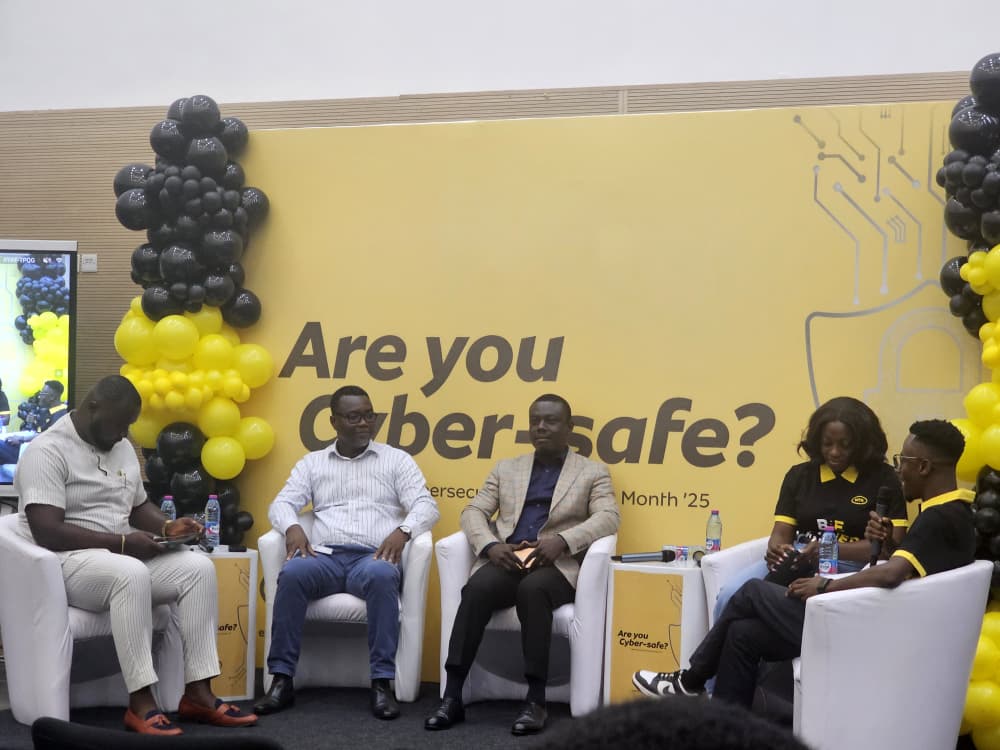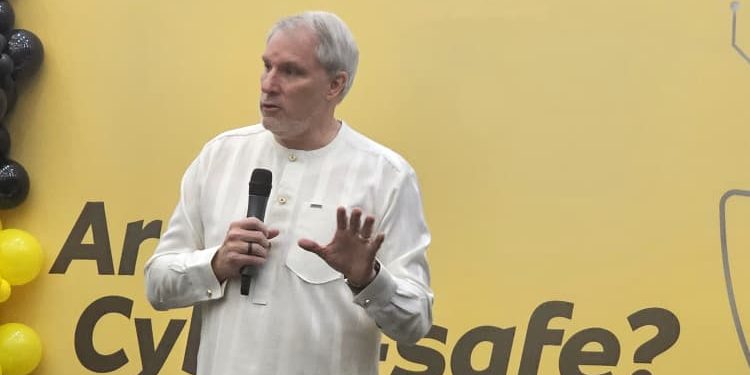The Chief Executive Officer of MTN Ghana, Stephen Blewett, has urged individuals and organisations to remain vigilant and proactive in safeguarding themselves against cyber threats.
He noted that digital safety must evolve in step with rapid technological change.
Speaking at the MTN Cybersecurity Chat, which concluded this year’s Cybersecurity Awareness Month, he stressed the importance of continuous learning and awareness as key defenses in an era of increasing online vulnerabilities.
“Technology is moving really quickly, and with that speed comes new risks,
We all have to update our skills to stay aware and protected. Ten years ago, no one even talked about cybersecurity — but today, everyone has either been affected or knows someone who has.” he said.
Don’t wait until tomorrow to learn
Stephen Blewett cautioned against complacency, urging the public not to delay taking action on cybersecurity awareness.
“Don’t leave it until tomorrow to understand what’s happening today. If you do, you expose yourself — and your company — to risks that can be crippling.
The people using these technologies for the wrong reasons aren’t sleeping. They’re working every day on the next attack,” he warned.
He described artificial intelligence (AI) as a powerful but double-edged tool, explaining that while it offers great opportunities, it is increasingly being exploited by cybercriminals for scams, impersonations, and data breaches.
“AI is a positive development, but it’s also being used negatively. We’ve seen cases where fake videos or audio clips mimic real people to deceive others. That’s why being aware of how these tools work is crucial,” he explained.
Pause, Think Before You Click
The Acting Chief Information Officer (CIO) and General Manager for IT Operations at MTN Ghana, Joseph Adumuah, urged staff, customers, and the public to take personal responsibility for cybersecurity by exercising caution online and adopting stronger digital protection habits.
He emphasised that awareness and continuous education remain the strongest tools in protecting individuals and organisations from growing cyber threats.
“Awareness is key. We must all participate and enhance our knowledge so that we don’t become the weakest link for the company,” he said.
Joseph Adumuah echoed the CEO’s earlier caution about online scams, reminding participants that most cyberattacks begin with a simple click on a suspicious link or message.
“Think before you click. There’s nothing really free online. Anything that looks too good to be true probably is. Always tell yourself that you must work hard and earn what you get,” he advised.
He urged the public to remain sceptical of unsolicited offers, fake investment schemes, and “free” downloads that often serve as traps for phishing or data theft.

Every security breach is a big one
Lead Specialist in IT Strategy and Solutions Architecture at MTN Ghana, Raphael Acquah, has cautioned that every cybersecurity threat, no matter how small it appears, must be treated as a major risk with potentially devastating consequences for individuals, families, and organisations.
He stressed that Ghana’s growing dependence on digital systems has widened exposure to cyberattacks, making vigilance and early detection more critical than ever.
“Every security threat is a major threat. Whether it targets you as an individual, your family, or your organisation, the impact can be widespread.
In a digital world where systems are increasingly connected, one weak link can expose everything.” He said.
Raphael Acquah explained that the emergence of Advanced Persistent Threats (APTs), sophisticated cyberattacks carried out by highly skilled hackers, poses one of the greatest risks to businesses today.
He urged businesses to adopt a “shift-left security approach” — integrating security measures at the earliest stages of digital development — to ensure vulnerabilities are detected and fixed before systems go live.
Your data is the new gold — guard it
Senior Manager for Enterprise Risk Management at MTN Mobile Money Limited, Nanatunde Davies, urged Ghanaians to take greater responsibility for their digital security, warning that even seemingly harmless online habits can expose personal identities, finances, and biometric data to cybercriminals.
She stressed that as more people live, work, and transact online, protecting digital assets such as passwords, bank details, and personal information has become a matter of national importance.
She advised individuals and businesses to adopt stronger security measures, including password managers, passkeys, and multi-factor authentication, to secure their online accounts.
She emphasised that weak passwords and poor digital hygiene remain the easiest entry points for hackers.
“Avoid using personal details like your birthday or phone number as passwords. Mix letters, numbers, and special characters — and change them regularly,” she said.
Cyber Security Authority Calls for Stronger Protection of Ghana’s Digital Infrastructure
Senior Manager at the Cyber Security Authority (CSA), Gerald Awadzie, emphasised the urgent need for stronger cybersecurity measures to protect the country’s rapidly expanding digital infrastructure.
He also warned that the nation’s growing reliance on technology exposes it to significant risks.
He said Ghana’s future is undeniably digital — from public services to personal transactions, and that safeguarding digital systems is now a matter of national importance.













